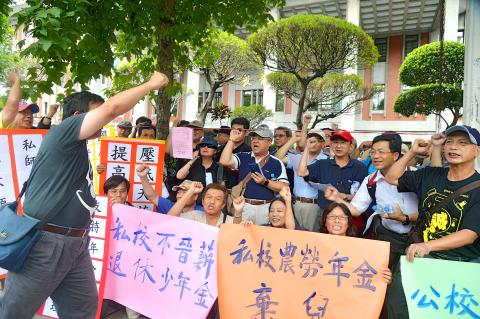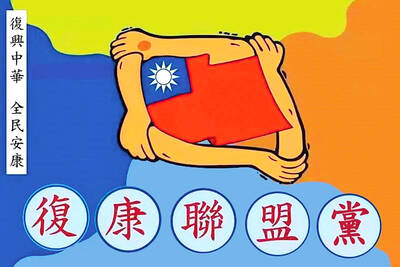A group of private-school teachers yesterday staged a protest in front of the Ministry of Education to call for the establishment of a fair pension system so that the entitlements of public and private-school teachers are in balance.
Shouting slogans, about 40 protesters demanded that the government create a unified pension distribution mechanism for public and private-school teachers, that the income replacement ratio for private-school teachers be raised, and that private-school teachers be put on the Presidential Office’s pension reform committee.
Chien Tien-chih (簡添枝), a retired teacher who worked at Tun Hsu Vocational High School in Taipei, said that private-school teachers’ pensions are listed under the Public Servants and Teachers Insurance system, but there is a huge difference in the pensions received by them and public-school teachers.

Photo: CNA
All teachers are required to pay from NT$1.5 million to NT$1.7 million (US$47,314 to US$53,623) in premiums and retirement payments, which they are able to reclaim in their retirement, he said.
However, public-school teachers receive an average pension of NT$68,000 per month, while private-school teachers receive only about NT$18,000 per month.
This shows that income replacement rates enjoyed by teachers at public schools and those at private schools are disproportionate — about 80 percent and 20 percent respectively.
Chien said that public-school teachers are paid pensions from the first month of their retirement, while private-school teachers sometimes have to wait up to six months before they can receive their monthly pensions in full.
This is because pensions issued to private-school teachers are managed by three different institutions — school administrators, local education authorities and the Ministry of Civil Service — while pensions paid to public-school teachers are handled by the ministry alone, he said.
He called for the appointment of a single agency dedicated to handling pensions for private-school teachers.
Chung Hwa University of Medical Technology teacher Chen Tzu-chi (陳自治) said that private-school teachers are a minority group in the pension system.
Chen called on President Tsai Ing-wen (蔡英文) to show sympathy for private-school teachers by granting their appeals.
He said the pension that private-school teachers receive is not enough to make ends meet, which is an “insult” to them.
De Lin Institute of Technology teacher Chen Chi-liu (諶其騮) when asked why there was such a discrepancy in the turnout of teachers for and against pension reforms yesterday, said that higher pensions for private-school teachers mean their employers have to allocate more money for their premiums.
Consequently, many private-school teachers are afraid to take part in protests over the fear that their employers might subsequently deny them promotion, which would hurt their pension quotas, he said.
About five minutes into the protest, police officers pronounced the protest illegal and asked the protesters to leave the site, saying that rally leaders had not requested the right to use the roads prior to the event.
The announcement sparked the ire of several demonstrators, who then led other protesters into the ministry compound, where they chanted slogans and asked Deputy Minister of Education Chen Der-hwa (陳德華) to come out and accept their petition.
The move prompted dozens of police officers to form a phalanx with their shields in front of the ministry’s gates.
A ministry official later emerged and received the petition in lieu of Chen.
Meanwhile, students who had staged protests in front of the ministry expressed disbelief over the ministry’s handling of the protesters.
Chia Nan University of Pharmacy and Science student Yu Teng-chieh (游騰傑), a prominent figure in last year’s protest against the controversial high-school curriculum guideline changes, and Fu Jen Catholic University student Huang Tai-li (黃台禮), who campaigned against curfews at female students’ dormitories, said they had never been asked to make appointments prior to protesting in front of the ministry.

AIR DEFENSE: The Norwegian missile system has proved highly effective in Ukraine in its war against Russia, and the US has recommended it for Taiwan, an expert said The Norwegian Advanced Surface-to-Air Missile Systems (NASAMS) Taiwan ordered from the US would be installed in strategically important positions in Taipei and New Taipei City to guard the region, the Ministry of National Defense said in statement yesterday. The air defense system would be deployed in Taipei’s Songshan District (松山) and New Taipei City’s Tamsui District (淡水), the ministry said, adding that the systems could be delivered as soon as the end of this year. The US Defense Security Cooperation Agency has previously said that three NASAMS would be sold to Taiwan. The weapons are part of the 17th US arms sale to

SERIOUS ALLEGATIONS: The suspects formed spy networks and paramilitary groups to kill government officials during a possible Chinese invasion, prosecutors said Prosecutors have indicted seven retired military officers, members of the Rehabilitation Alliance Party, for allegedly obtaining funds from China, and forming paramilitary groups and assassination squads in Taiwan to collaborate with Chinese troops in a possible war. The suspects contravened the National Security Act (國家安全法) by taking photos and drawing maps of key radar stations, missile installations and the American Institute in Taiwan’s headquarters in Taipei, prosecutors said. They allegedly prepared to collaborate with China during a possible invasion of Taiwan, prosecutors said. Retired military officer Chu Hung-i (屈宏義), 62, a Republic of China Army Academy graduate, went to China

INSURRECTION: The NSB said it found evidence the CCP was seeking snipers in Taiwan to target members of the military and foreign organizations in the event of an invasion The number of Chinese spies prosecuted in Taiwan has grown threefold over a four-year period, the National Security Bureau (NSB) said in a report released yesterday. In 2021 and 2022, 16 and 10 spies were prosecuted respectively, but that number grew to 64 last year, it said, adding that the Chinese Communist Party (CCP) was working with gangs in Taiwan to develop a network of armed spies. Spies in Taiwan have on behalf of the CCP used a variety of channels and methods to infiltrate all sectors of the country, and recruited Taiwanese to cooperate in developing organizations and obtaining sensitive information

BREAKTHROUGH: The US is making chips on par in yield and quality with Taiwan, despite people saying that it could not happen, the official said Taiwan Semiconductor Manufacturing Co (TSMC, 台積電) has begun producing advanced 4-nanometer (nm) chips for US customers in Arizona, US Secretary of Commerce Gina Raimondo said, a milestone in the semiconductor efforts of the administration of US President Joe Biden. In November last year, the commerce department finalized a US$6.6 billion grant to TSMC’s US unit for semiconductor production in Phoenix, Arizona. “For the first time ever in our country’s history, we are making leading edge 4-nanometer chips on American soil, American workers — on par in yield and quality with Taiwan,” Raimondo said, adding that production had begun in recent